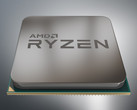AMD's Ryzen platform made its Summit Ridge notebook debut on last year's Asus Strix GL702ZC to surprising performance results. The following months saw the introduction of the more efficient Raven Ridge Ryzen 5 2500U onto models such as the HP Envy x360 15 and Acer Swift 3, but it wasn't until late January that we'd finally get our hands on another mobile Summit Ridge offering.
Our second Summit Ridge notebook carries the mainstream Ryzen 5 1600 as opposed to the performance-oriented Ryzen 7 1700 we benchmarked last year. Perhaps unsurprisingly, Asus is our provider once again since the manufacturer has simply swapped out the socketed Ryzen 7 CPU in the GL702ZC with the Ryzen 5.
As shown by our comparison chart below, AMD's hexa-core Ryzen 5 1600 in our Asus GL702ZC performs nearly as fast as our reference desktop Ryzen 5 1600 in both single- and multi-threaded CineBench tests. Its multi-thread performance is particularly strong with a final score in between that of the quad-core Core i7-7700K and brand new hexa-core Core i7-8700K. In comparison, most gaming laptops sold today utilize either the Core i7-6700HQ or Core i7-7700HQ that are each about 35 percent slower than this mid-range AMD solution.
A notable drawback to the increased performance of the Ryzen 5 is its higher TDP. At 65 W, the CPU may demand a stronger cooling solution than the typical 45 W Intel HQ-class CPU or risk higher operating temperatures. Furthermore, single-thread performance is slightly slower than the Core i7-7700HQ due in part to the slightly higher clock rate of the Intel processor (3.6 GHz vs. 3.8 GHz). The adoption rate for AMD processors in gaming notebooks will likely remain niche for the time being since these Ryzen CPUs are socketed solutions, but it's refreshing to see more AMD-based gaming laptops nonetheless.
| Geekbench 3 | |
| 32 Bit Multi-Core Score | |
| Asus GL702ZC-GC104T | |
| Asus ROG Strix GL702ZC-GC204T | |
| 32 Bit Single-Core Score | |
| Asus GL702ZC-GC104T | |
| Asus ROG Strix GL702ZC-GC204T | |
| Geekbench 4.4 | |
| 64 Bit Multi-Core Score | |
| Coffee Lake: i7-8700K and i5-8400 Review | |
| Asus GL702ZC-GC104T | |
| Asus ROG Strix GL702ZC-GC204T | |
| 64 Bit Single-Core Score | |
| Coffee Lake: i7-8700K and i5-8400 Review | |
| Asus GL702ZC-GC104T | |
| Asus ROG Strix GL702ZC-GC204T | |
| Mozilla Kraken 1.1 - Total | |
| Asus GL702ZC-GC104T (Edge 15) | |
| Asus ROG Strix GL702ZC-GC204T (Edge 41) | |
| Asus Strix GL702VSK (Microsoft Edge 38.14393.0.0) | |
| Eurocom Tornado F5 (Edge 38.14393.0.0) | |
| Eurocom Sky X9C (Edge 41.16299.15.0) | |
| Octane V2 - Total Score | |
| Eurocom Sky X9C (Edge 41.16299.15.0) | |
| Asus Strix GL702VSK (Microsoft Edge 38.14393.0.0) | |
| Asus GL702ZC-GC104T (Edge 15) | |
| Asus ROG Strix GL702ZC-GC204T (Edge 41) | |
| JetStream 1.1 - Total Score | |
| Eurocom Sky X9C (Edge 41.16299.15.0) | |
| Eurocom Tornado F5 (Edge 38.14393.0.0) | |
| Asus Strix GL702VSK (Microsoft Edge 38.14393.0.0) | |
| Asus GL702ZC-GC104T (Edge 15) | |
| Asus ROG Strix GL702ZC-GC204T (Edge 41) | |
* ... smaller is better
Source(s)
Own













